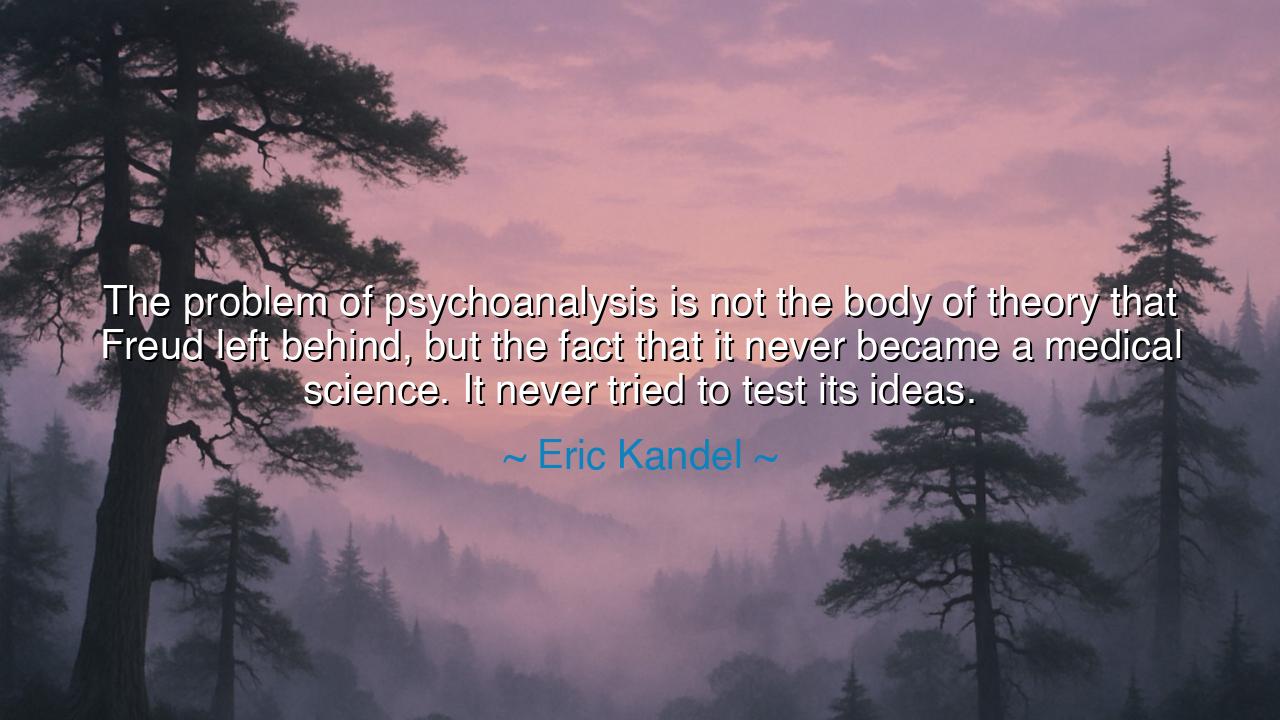
The problem of psychoanalysis is not the body of theory that
The problem of psychoanalysis is not the body of theory that Freud left behind, but the fact that it never became a medical science. It never tried to test its ideas.






Hear, O seekers of truth and knowledge, the words of Eric Kandel, master of memory and Nobel laureate: “The problem of psychoanalysis is not the body of theory that Freud left behind, but the fact that it never became a medical science. It never tried to test its ideas.” These words strike with both reverence and reproach. Reverence, for the vision of Freud, who first dared to map the hidden chambers of the human soul. Reproach, for the failure of his followers to temper those visions with the discipline of science.
The origin of this saying lies in Kandel’s lifelong journey, standing at the crossroads of neuroscience and psychiatry. He recognized Freud’s genius—that to name the unconscious was to uncover a continent within the human mind. But Kandel also saw the weakness of Freud’s legacy: psychoanalysis became a temple of interpretation rather than an arena of experiment. Its priests spoke with authority, but they did not test their proclamations in the fires of evidence. Thus, while biology advanced with laboratories and trials, psychoanalysis lingered in the realm of speculation.
To say it “never became a medical science” is to remind us of the true nature of medicine. Medicine does not rest upon faith in the words of the master, but upon testing, upon evidence gathered and examined, upon ideas that can be measured and either proven or cast aside. Without this, medicine ceases to heal and becomes philosophy alone. Kandel mourned this gap, for he believed that the union of Freud’s vision with the rigor of modern science could have forged a far greater understanding of the mind.
History shows us the peril of ideas untested. In ancient times, the doctrine of the four humors guided physicians for centuries. Blood, phlegm, yellow bile, black bile—these were said to rule all illness. Though revered, this theory was never truly tested, and so generations suffered under treatments that bled the strong and weakened the sick. Only when science rose, when experiment replaced speculation, did medicine break its chains. Kandel’s warning is the same: even the noblest theory is powerless until it bends to the discipline of evidence.
Yet we must not despise Freud’s work. For though flawed in science, it was rich in imagination. He dared to say that dreams mattered, that childhood shaped the adult, that hidden forces moved the mind beneath awareness. These insights changed art, literature, and culture forever. But Kandel urges us not to stop there. He calls us to marry Freud’s vision with the tools of neuroscience, genetics, and biology, so that the hidden chambers of the psyche may be illuminated not only by speculation but by knowledge tested and refined.
The lesson is plain: love ideas, but do not worship them. Cherish the visionaries, but demand of their visions the trial of evidence. In every field—be it medicine, politics, or philosophy—beware the seduction of untested belief. For belief alone can inspire, but only testing can heal, protect, and endure. The true revolutionary is not only the dreamer, but the one who builds the bridge between dream and proof.
Therefore, O listeners, let your practice be this: when you encounter theories of the mind, of the body, of the world, do not ask only, “Is this beautiful?” Ask also, “Has this been tested?” Demand evidence, for in evidence lies protection against error. Yet do not let evidence smother imagination, for without vision there is nothing to test. The wise soul honors both: the dreamer who imagines and the scientist who verifies.
Thus let Kandel’s words endure: “The problem of psychoanalysis is not the body of theory that Freud left behind, but that it never became a medical science.” Carry this as a torch: theory must wed evidence, imagination must meet discipline, and only then does knowledge become truth.






AAdministratorAdministrator
Welcome, honored guests. Please leave a comment, we will respond soon